Prompt 245. All the Dogs I've Loved
& the surfer Nathan Lowdermilk on your best memories
Hi friend,
I spent last week at my farmhouse in rural New Jersey, where the natural world is just reaching the vibrant lushness that truly feels like summer. The alliums in my garden are blooming, big beds of alien-looking purple pom poms. River was so thrilled to be in the country she spent her days tearing around the yard and right through the garden. It probably wasn’t great for the plants, but I couldn’t bear to stop her. I get such joy seeing her so happy, feeling so free. Dogs have so much to teach us about how to seek out and savor small joys.
That’s only one of many lessons my dogs have taught me—something I’ve been reflecting on recently. The other day, my mom sent me a photograph of me with my first dog, Zazou. He was a rescue—a beat-up pitbull/Shar-Pei mix we picked up from the local pound. When a family friend said he was the ugliest dog they’d ever seen, we were all offended, as we thought he was beautiful. And as I was deep in an ugly duckling phase, I felt especially so.
Like many rescues, Zazou had a bottomless well of gratitude and hunger for love and was more than willing to give it in return. One day, some kids at school were teasing me, calling me “Cuckoo Susu” (in retrospect, not inaccurate), and when I got home, I immediately ran up to my room and started crying. And then Zazou appeared and put his head on my knee with such pure tenderness and compassion, and suddenly I felt this heart-expanding love I’d never felt for an animal before. He was the first to teach me the depth of feeling possible between a dog and its human, and the solace and steadiness that comes with that kind of connection.
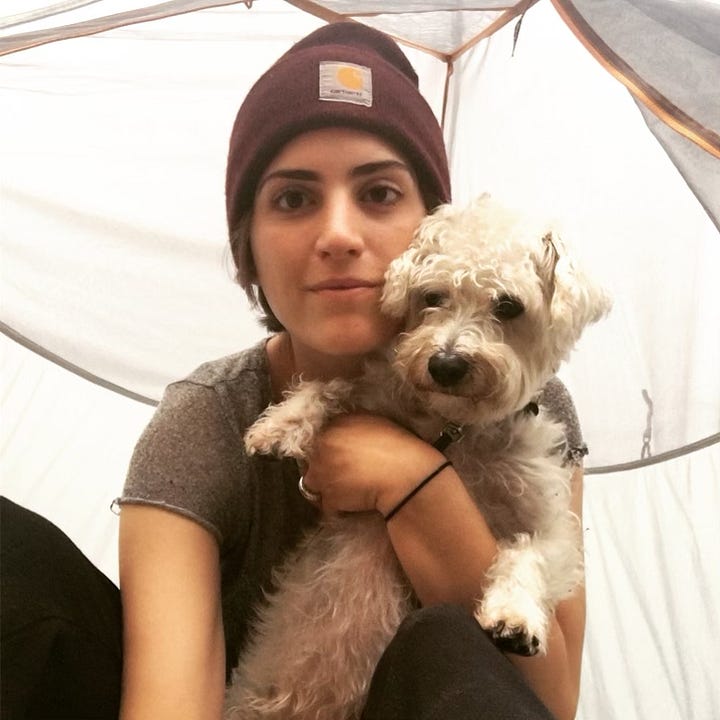
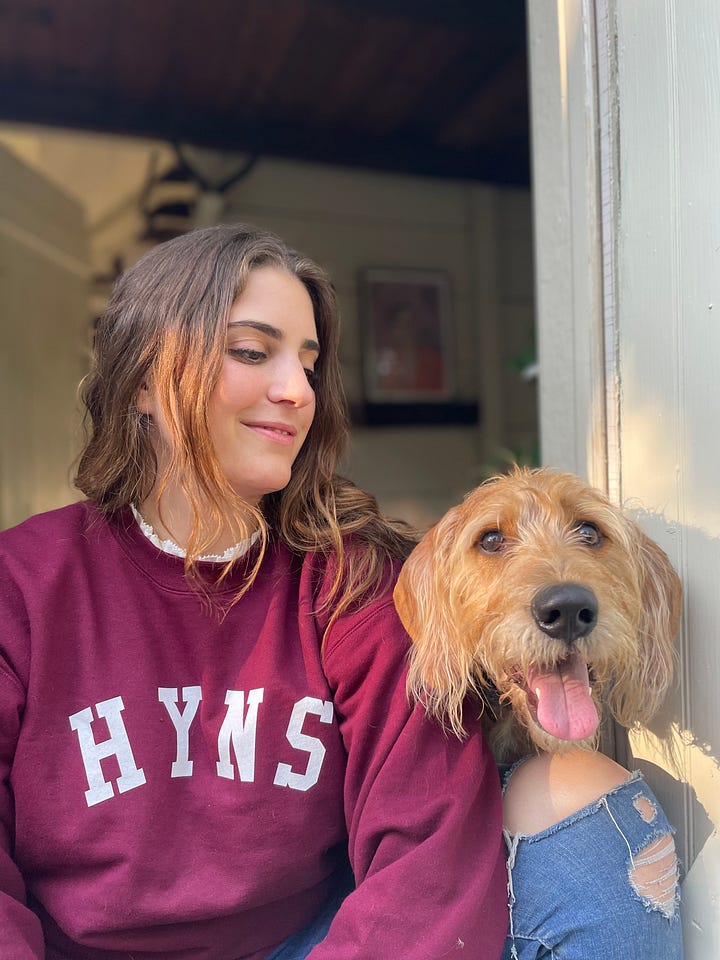
Then there was Oscar, the infamously badly behaved scruffy Schnoodle (later dubbed “the Writer Biter,” later “the Little Lord” by one of the esteemed writers he bit). I adopted him right after my first bone marrow transplant ten years ago, and he was the best decision I made in my twenties. When I first got him, I was still fearful in my body, still unsure of how to return to the wider world, but Oscar was not. All fifteen pounds of him proved fearless during our 15,000-mile cross-country road trip (though he did glower at me from the backseat for making him spend hours in the car). Once when we were at a cabin in Vermont, a bear ambled up, and Oscar took off after it and chased it into the woods. A little reckless, sure—but it made me want to move through the world with confidence, believing that I could handle whatever came along.
It was during the height of the pandemic that Loulou, a hound dog-terrier stray from Tennessee, came into my life. My brother adopted her initially, but unbeknownst to us, she arrived into our lives extremely sick with a fungal infection that almost killed her. It left her twenty pounds underweight and blind, and she was struggling in New York City—every sound on the street sent her cowering, trembling. When she came to live with me in the country, she was terrified, but little by little she began to lean into her other senses and explore. And after a handful of missteps (she definitely ran full force into a tree but somehow emerged unscathed), she began to map her world. She would lift her snout to narrowly miss the piano in the living room, and she could sidestep every bush and flower bed in the yard. When I learned of my leukemia relapse and had to rehome her, it broke my heart, but her example has stuck with me. Within disability or limitation, it’s possible to rebuild and, in doing so, to tap into other parts of yourself you didn’t even know were there.

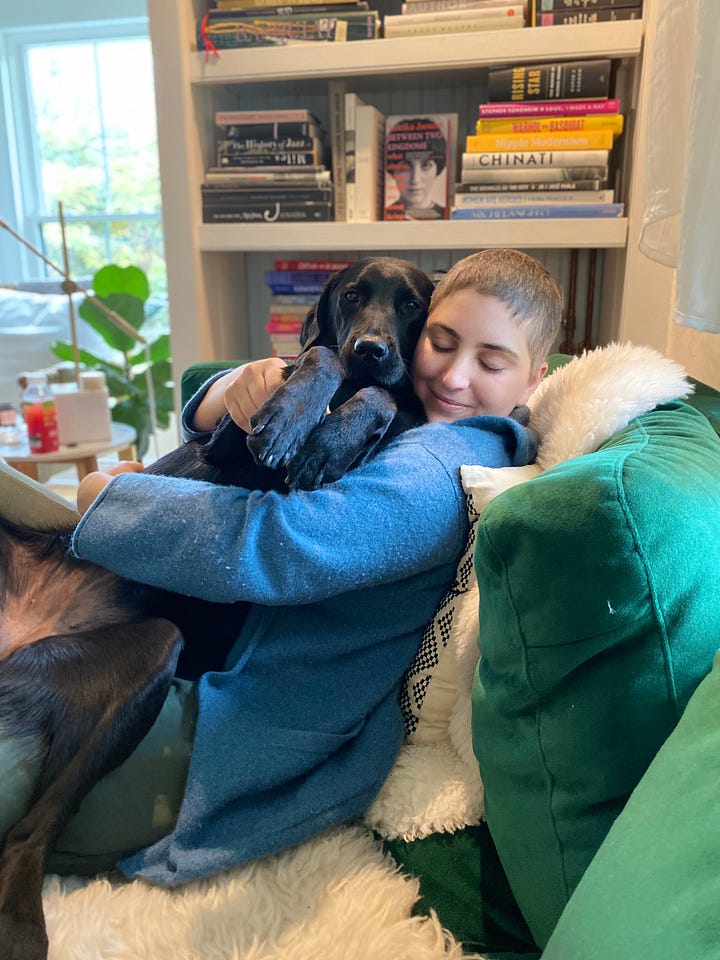
When Oscar died last February—while I was in the hospital undergoing my second bone marrow transplant no less—the loss felt obliterating. I thought of the man I met in Oregon during my road trip, who told me, “If you’re lucky, you get one great dog love in your life.” I thought Oscar was mine, that I would never love a dog like that again. A few months later, I was missing him so much that I tried fostering an energetic noodle of a puppy named Franny. She’d been rescued on the beaches of Aruba, and she was wonderful in so many ways, but I just wasn’t well enough to care for a puppy. That was a heartbreaking lesson—to realize the extent of my limitations, and that I needed a different kind of dog relationship. And until the right dog came along, I needed to be patient.
Only two weeks later, I got the call: River was on her way. And River, sweet River—where to even begin? She’s a career-redirected seeing-eye dog that my sweet friend Hollye Jacobs put me on a waitlist for shortly after Oscar died. River is the complete opposite of every dog I’ve ever had. Usually I’m the one doing the rescuing and rehabilitating, but River has been trained to take care of me. She has zero trauma and is extraordinarily well-behaved. She’s a quiet, grounding presence with a maternal fierceness. (You should see her with her stuffed animals, carrying them so carefully from room to room, and up to her bed at night.) I don’t like to invoke battle metaphors with illness, but when you’ve been brutalized by something like cancer, it does sometimes feel like a fight—to muscle through, to push past fatigue, just to get the normal life things done. In the last year, River has helped me slow down and access a tenderness and a gentleness for myself. Her steadiness has made me steadier, her patience has made me—well, that’s a work in progress.

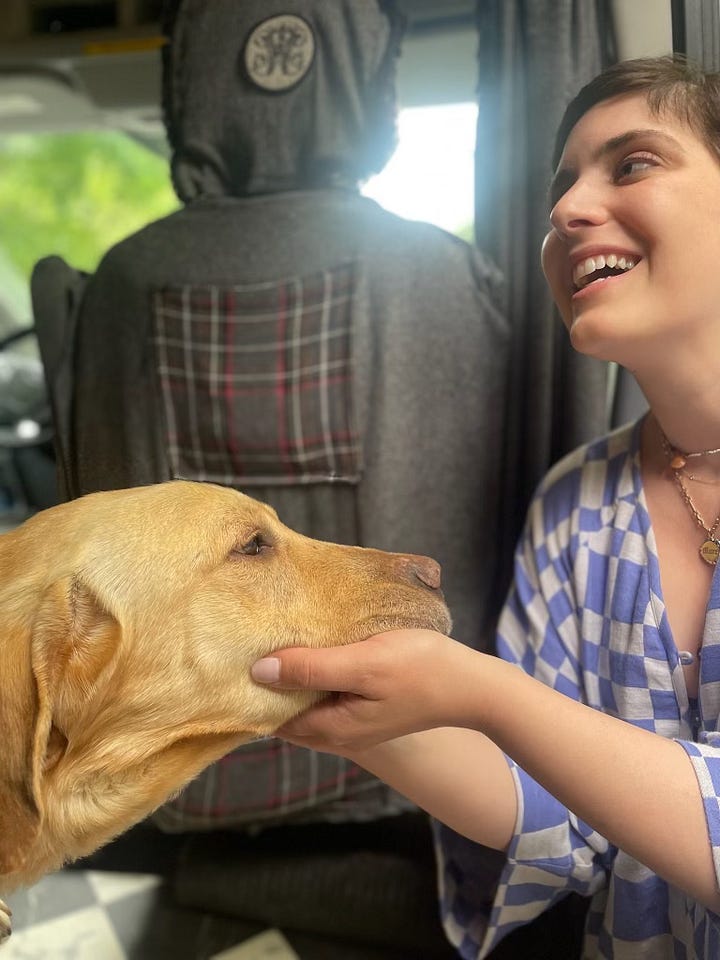
There’s a part of me that has always wanted a whole wolf pack, though I would happily settle for two dogs—nothing I love more than sitting on the couch with a pup snuggled up on either side. And since River arrived, that’s happened twice. Back in September, I fostered a tiny singing chihuahua named Maude, who taught me that I’m capable of loving a dog with my full heart, but it can be temporary. I can be the matchmaker between a dog and their human.
Which brings me to Lionel, the most recent addition to my roster of pups. Two weeks ago, in a fit of good writerly procrastination, I opened Instagram, saw his picture, and immediately applied to foster him. (It was only when I was on my way to pick him up that I realized I hadn’t asked my husband, Jon. I’m very fortunate he has a soft spot for my soft spot for rescue pups. As he said, “I know who I married.”) Lionel has a devastating backstory. Only two months ago, he was found in rural Kentucky after being shot in the head, which he remarkably survived. Miraculously, the only lasting effect is a little wobbliness. He’s been with us for about two weeks, and I’ve just convinced my best friend Lizzie to adopt him. The other day, she took him out to the Rockaways, where she goes surfing, and she sent a video of him running along the beach, the happiest dog, and she looked like the happiest human. Now I’m already plotting my next canine-human matchmaking project—sorry, Jon!
And here after recalling all my dogs—so lovely, so bittersweet—I’m going to send you to the ocean. We have an essay and prompt by the surfer Nathan Lowdermilk, who shares with us what he thinks about while waiting for the perfect wave. Whether waiting for a train or at the airport or (lord help) the DMV, it’s a beautiful, useful practice, one sure to brighten the cloudiest day.
Sending love,
Suleika
Some items of note—
Just this week, I had the honor of joining the writer and speaker
on The Active Voice, the podcast of Substack co-founder Hamish McKenzie. I came away from our conversation feeling wiser and freer, and I hope it does the same for you. Give it a listen and let me know what you think!Last Sunday at the Hatch, our virtual creative hour, we tackled the difficult topic of shame, but in a way that felt so liberating. Don’t worry—if you missed it, we’ve posted a recap. Paid subscribers can access it here!
In preparation for the next installment of my advice column Dear Susu, I’ve been thinking about the power of collaborative thinking and I’m wondering: Do you have any lingering questions—any knots we could untangle together? About writing, life, or anything in between? Send your query and any necessary context to suleika@theisolationjournals.com.
Prompt 245. Past the Break by Nathan Lowdermilk
I didn’t always love the water. On a school field trip when I was about five, some kids told me that the swimming pool was shallow. Though I wasn’t a strong swimmer, I jumped into the deep end, and it didn’t go well. The lifeguard had to save me, and I was afraid of water after that.
But I spent every other weekend with my dad in Waves, a small stretch on the Outer Banks of North Carolina, about thirty miles south of where I lived with my mom. My dad was a serious surfer, and he took my older brother and me to the beach a lot. Because I was terrified of the waves, I’d sit on the shore and watch as my dad and brother paddled out for hours. Finally my dad started putting me on the front of his surfboard and taking me out. When we made it past the break, it felt like a whole different world. It felt like my safe zone. I was hooked.
I don’t think I’ve ever been away from the water for more than two weeks at a time in my whole life. I’ve spent a lot of time in Central America and the Caribbean, catching waves and surf guiding. Still the Outer Banks is home. It’s simple, just empty sand dunes on a two-lane road, barely any street lights or stop signs, and never too crowded because the waves are unpredictable. When the conditions are right, they’re some of the most perfectly shaped shore-break waves you can find. But you have to be patient and pay close attention to the wind forecast and the tides.
As a surf instructor, I mostly work with kids. Our normal conditions are great for beginners—waves one to two feet, perfect size to start. Before we ever get in the water, I try to convey everything I’m thinking when I’m out there—everything from wind direction, swell, and rip currents, to paddling and popping up—and then we head out. Some kids get pretty frothed up about catching so many waves, others want to chat me up about my life. Sometimes we end up in a lull between sets, and I ask them questions about theirs—like what their interests are, like if they play sports, if they have any buzzer-beater wins. I tell them that when I’m hanging out and waiting for a wave, I think back to moments like that as a way to pass the time.
I don’t really remember how I started it; I just know that’s where my mind goes. Surfing is a sport that requires a lot of patience—to learn to read the movements of the ocean, to spot a set of waves coming in, to know where to be to catch the one you want. There’s a lot of downtime, watching and waiting, often with no one to talk to. In those moments, I find myself thinking about going surfing with my nine-year-old niece, pushing her into waves. I think back to a handful of days surfing with my best friends at home, scoring the best waves of our lives.
Or I think about the best wave I ever caught, which was here in the Outer Banks. It was at a spot about an hour from where I live, near an old lighthouse where a wave breaks. I went with a friend who doesn’t surf as much as me, and I had paddled a little further out by the time a giant set came in. I watched five waves explode on him, and he gave up and went back to shore.
Then this wave rose up, perfectly shaped, the length of a football field. I caught it, and I stood in three different barrels. Afterward, I looked around, and not one single person was there except my friend. Had he not been, maybe no one would have believed it. I sometimes can’t believe I’m so lucky—to surf perfect waves right where I live.
Your prompt for the week:
Imagine you’re out past the break, waiting for the perfect wave. All you can see is water and sky and a distant shore. All you can hear is wind, the waves, the seagulls calling overhead. Now call to mind your best memories—times with family or friends, places you’ve visited, small moments that mean something to you but maybe you don’t often think about—and write them down.
You can do this whenever you want. It’s a deep ocean. Memories often spark other memories.
If you’d like, you can post your response in the comments section, in our Facebook group, or on Instagram by tagging @theisolationjournals.
Today’s Contributor—
Nathan Lowdermilk is a surfer and the founder of Native Surf School on the Outer Banks of North Carolina. He has a decade of ocean rescue experience and deep, hard-won knowledge of waves, which he shares with students between the ages of 5-18. Nathan also spends part of the year as a guide at Two Brothers Surf Resort in Popoyo, Nicaragua. You can follow him on Instagram.
For more paid subscriber benefits see—
On Wonder, a video replay of my Studio Visit with the adventurer and bestselling author Jedidiah Jenkins, where we talk about rites of passage, shaking the sleeping self, and speaking things into existence
Shame Shepherds & Grace for Fuck-ups, the latest installment of Dear Susu where I tackle this question from Calvin, who after spending half his life in prison wants to tell his story: “How do I get out of my own way so that I can write what needs to be written most?”
The 30-Day Journaling Project, which explores the art of journaling and all it can contain. Note: It’s available for just a couple more days—until the end of May!










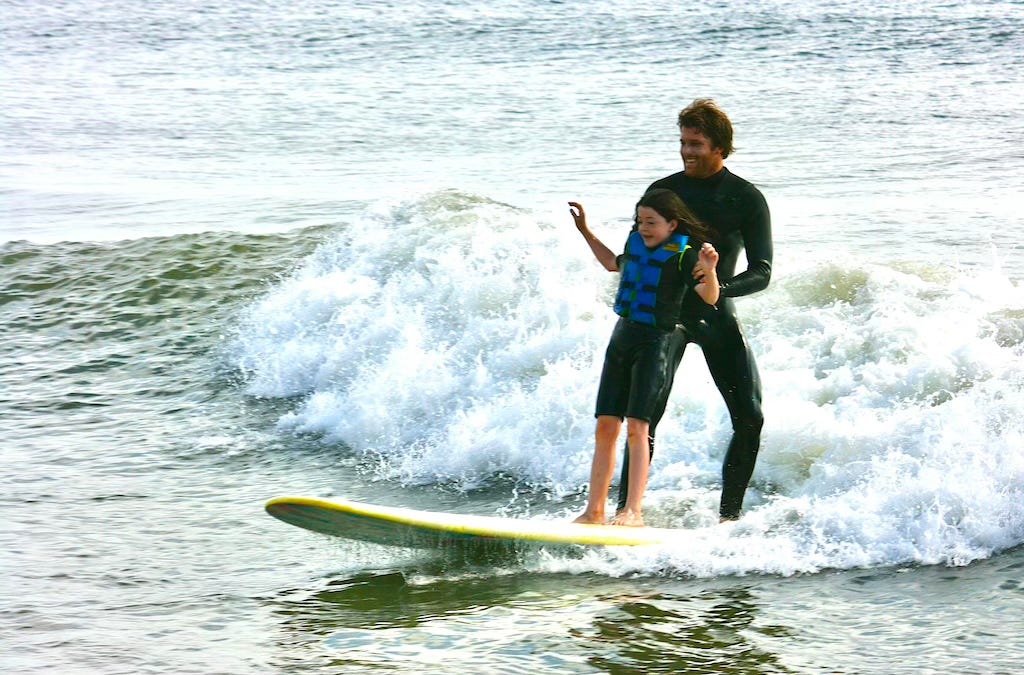

Simply the Best: (yeah, that is an hommage to Tina Turner) My mom rescuing my Teddy Bear named Freddie from the toilet when I was three. She was my hero, no lectures on how I shouldn't have been holding him while peeing, just a washing and hanging him on the line to dry. I kept vigil on the grass for hours as he blew in the summer wind. He was hung up by his ears, and Mom assured me he was happy to be clean and that "bears don't hurt in their ears." The moment she took him down, she passed him to me. I immediately stuffed him under my shirt so he would begin "smelling right." She laughed and told me, "What a clever girl you are. Freddie is lucky to have you to love him so." Whew, just writing this, brings tears to my eyes. Mom's gentle spirit lives in me. She does not recognize me now so I hold the memories of her so close to my heart.
I adopted a pyrenees lab mix in my 20s when all my friends were getting married and I was flailing in the feeling of being left behind. “I want someone who won’t leave me,” I kept saying. And not long after I found Georgia.
One day I came home from work and realized, for the first time in my life, someone was always, steadily, happy to see me come home.
It’s hard to describe what it feels like to go through life as an autistic child, then teen and an adult, always feeling you’re “wrong” and everyone else gets it “right.” But Georgia saw me. That’s what animals do, isn’t it? They don’t believe the language we’ve attached to ourselves—they just love with their whole bodies. It still makes me weepy to think Georgia loved me without me needing to pretend.
May we all know that kind of love. 🧡
Also: I am thankful for people like Suleika who can be a Love Bridge for humans looking for their animals.